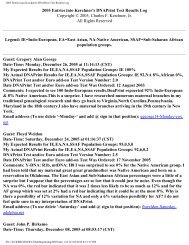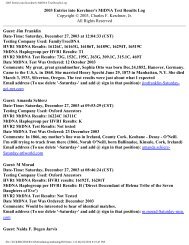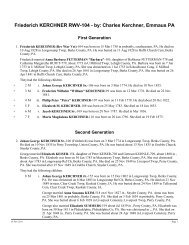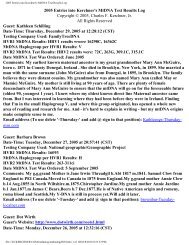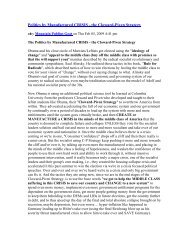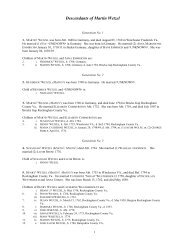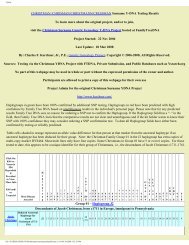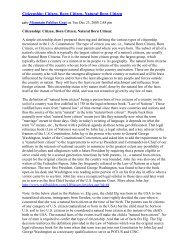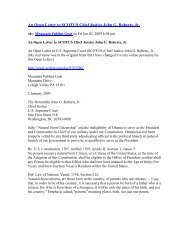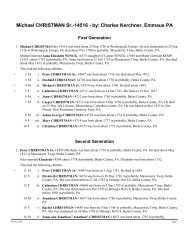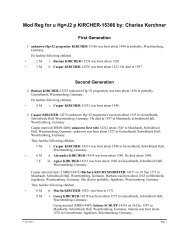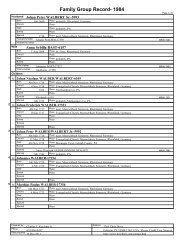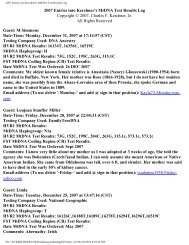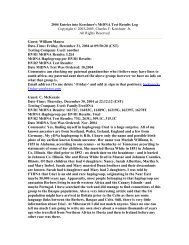MidWest Roots 2008 Genealogy Conference - Kerchner
MidWest Roots 2008 Genealogy Conference - Kerchner
MidWest Roots 2008 Genealogy Conference - Kerchner
Create successful ePaper yourself
Turn your PDF publications into a flip-book with our unique Google optimized e-Paper software.
Saturda<br />
day, , Aug<br />
ug. 16, , <strong>2008</strong><br />
8 A.M.–4 P.M. Registration<br />
8 A.M.–4 P.M. Exhibit Hall<br />
8:45 A.M. Welcome<br />
9–10 A.M.<br />
OPENING SESSION<br />
Cases That Make My Brain Hurt<br />
Megan Smolenyak Smolenyak S-19<br />
How could brothers also be uncle<br />
and nephew? How could a soldier<br />
killed in Korea be alive 55 years<br />
later? How could the 1853 death of a<br />
toddler in Scotland help solve a Civil<br />
War history-mystery? Come and<br />
hear!<br />
10:30–1<br />
0:30–11:30<br />
1:30 A.M. LUNCH<br />
Doing Effective Genealogical Research in Libraries<br />
Curt B. Witcher S-20<br />
Lunches will<br />
This talk focuses on understanding the four major<br />
be available<br />
types of libraries—academic, private, public and<br />
11:30<br />
1:30 A.M.–1:30<br />
P.M.<br />
special—as well as techniques to prepare data in<br />
a manner in which it can be effectively presented<br />
Tak<br />
ake a break from<br />
to a librarian or archivist for review and“scouting”<br />
the sessions, visit with<br />
a facility before your visit.<br />
your friends<br />
Using Little-Known and Neglected Sources<br />
and experience the<br />
Christine Rose S-21<br />
exhibit hall.<br />
In this lecture a variety of records will be<br />
discussed, from land to federal to court and<br />
military. The examples presented will open<br />
many doors to the researchers who think<br />
they’ve examined everything.<br />
Automated Search Tools<br />
Beau Sharbough S-22<br />
Using GenSmarts, Google and site features at<br />
places like Ancestry.com and Footnote.com,<br />
you can find the needles in that huge<br />
haystack.<br />
Menu<br />
Sandwich Buffet<br />
Fruit Salad<br />
Chips<br />
Cookie or Brownie<br />
Coffee, Iced Tea<br />
1–2 P.M. 2:30–3:30 P. M. 4–5 P.M.<br />
Driving You Bonkers: Accessing State Hospital<br />
Records for Family Research<br />
Alan January S-24<br />
State hospital records are a gold mine of<br />
information. Learn how Indiana is managing access<br />
to state hospital records and how HIPAA impacts<br />
confidentiality statutes in Indiana and other states.<br />
Sponsored by the Friends of the Indiana State Archives<br />
Playing Hide and Seek in the U.S. Census<br />
Stephen Morse S-25<br />
The One-Step Census Web site presents a<br />
street aid for finding records (and has since<br />
been expanded to include 1910, 1920 and<br />
1940). The NARA and some commercial Web<br />
sites also have developed indexes. Learn<br />
various solutions to search using these tools.<br />
Preserving Family Photos<br />
Beau Sharbough S-26<br />
A demonstration of how to scan and restore<br />
photos using your scanner and some<br />
inexpensive software. We’ll also discuss how<br />
to take care of the originals and ways to share<br />
the photos with others.<br />
The Lost Colony DNA Project<br />
Roberta J. Estes S-23<br />
How did 115 Englishmen and women come to<br />
be lost in the Virginia wilderness in 1587?<br />
Mystery, murder, and intrigue...come and find<br />
out for yourself. Will we find them using DNA<br />
technology?<br />
Turning Your Research Into a Family History<br />
Nancy A. Massey S-28<br />
This presentation introduces the basics of<br />
turning your family history research into a book<br />
to be shared with others. Get help deciding the<br />
focus of your book, the organization of the book<br />
and how to create a publication that will be<br />
cherished by generations to come.<br />
Avoid the Crooked Path! Genealogical Problem Solving<br />
Christine Rose S-29<br />
Demonstrates with overheads and case<br />
studies how to zero in on the goal, reduce the<br />
problem and stay on the path to solve it. A<br />
great motivational talk.<br />
Innovative Tools to Connect Families<br />
David Lifferth S-30<br />
Discover FamilyLink.com, Inc. products and<br />
services including WorldVitalRecords.com and<br />
FamilyLink.com, as well as social networking<br />
Facebook applications such as We’re Related,<br />
Family Groups and My Will.<br />
Remembering Our Ancestors<br />
Megan Smolenyak Smolenyak S-32<br />
Let yourself be amused, amazed and touched<br />
by stories of the many creative ways people<br />
have developed to pay tribute to those who<br />
came before us, as well as tales of how some<br />
stubborn brick walls have come tumbling<br />
down in the most unexpected ways.<br />
Deep Linking and Deeper Linking: How to Get the<br />
Most Out of Existing Search Applications<br />
Stephen Morse S-33<br />
Deep linking provides a means of optimizing<br />
the information extracted from existing thirdparty<br />
Web sites in general, and from search<br />
applications in particular. These tools are<br />
used on the One-Step Web site.<br />
Title TBA<br />
Dick Eastman S-34<br />
Where DID I Find That Document?<br />
Betty L. Warren S-27<br />
This session will examine suggested techniques for<br />
acceptable source citation with examples of<br />
sources specific to genealogical research, such as<br />
census records, oral interviews, land records, tax<br />
lists and the Internet.<br />
Sponsored by the Indiana Chapter of Palatines to America<br />
Newspaper Research: A Mirror of History<br />
Susan D. Kaufman S-31<br />
Newspapers are reflective of the thoughts,<br />
morals, events and times of the communities<br />
and society they represent. Although content<br />
can vary, newspapers offer a greater insight<br />
into and a picture of your ancestors’ lives.<br />
Who Went Where…& Did What?!<br />
Curt B. Witcher S-35<br />
Directories can provide consequential data in<br />
attempting to develop a context in which to<br />
conduct meaningful family history research.<br />
This lecture identifies different types of<br />
directories, discusses the type of information<br />
one can hope to find, and provides the<br />
researcher with ideas for locating directories.



